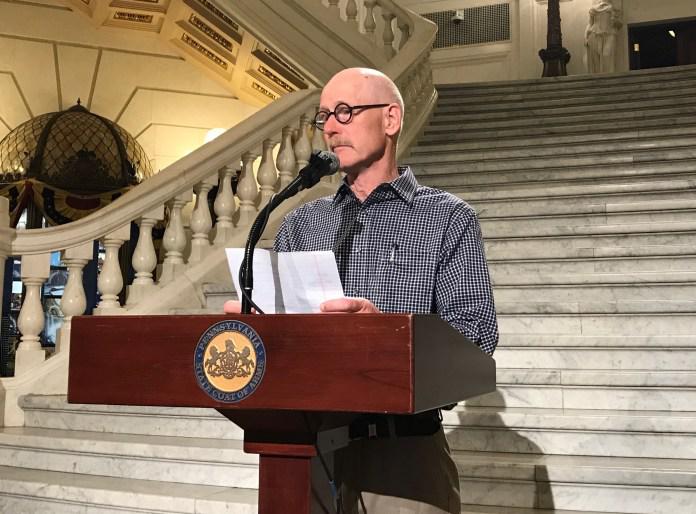|
Many clergy abuse victims can’t sue their abusers. Will a new legal strategy change that?
By Elizabeth Hardison
A Missouri man who says he was repeatedly raped by two Catholic priests in suburban Harrisburg sued his former diocese for fraud Tuesday, using a legal strategy that his attorneys hope could signal a sea change for clergy sex abuse victims across Pennsylvania. Donald Asbee, 67 of Hartsburg, Mo., was repeatedly fondled and raped by priests Raymond Daugherty and Walter Sempko at St. Joseph’s Roman Catholic Church in Milton, Pa., the suit filed in Dauphin County Court alleges. Asbee said the assaults occurred in the 1960s, when he was between the ages of nine and 13. Both of the priests who allegedly raped Asbee are dead. But the suit filed Tuesday morning doesn’t sue anyone for sexual abuse. Instead, it seeks unspecified monetary damages from the Diocese of Harrisburg and its former and current bishops, Kevin Rhoades and Ronald Gainer, who Asbee’s lawyers say committed conspiracy, fraud, and constructive fraud by failing to remove predatory priests from the parish and by allowing priests to exploit the trust of children and families. A grand jury report released in 2018 uncovered decades of child sexual abuse by 301 “predator priests” and a widespread coverup in six Catholic dioceses across Pennsylvania. Since then, state lawmakers have split on whether or not victims should be able to sue priests and dioceses for decades-old abuse. Pennsylvania’s statute of limitation laws currently give survivors of child sexual abuse until the age of 30 to sue their abusers. A bill currently stalled in the state Senate would eliminate the criminal statute of limitations on childhood sexual abuse and expand the civil window until a victim turns 55. Another would create a two-year retroactive window in which victims could file civil suits against their abusers, no matter when the abuse took place. Similar bills died in the Senate last year amid opposition from Republicans, who said the measure to open a retroactive window for civil suits is unconstitutional and would bankrupt churches. Attorney Richard Serbin hopes the strategy in Asbee’s case could offer a model to victims whose cases no longer fall within Pennsylvania’s statute of limitations for civil and criminal action. It mirrors a suit Serbin filed on behalf of Renee Rice, an adult clergy abuse survivor, against the Diocese of Altoona-Johnstown. A panel of Pennsylvania Superior Court judges said last month the case could proceed to trial, even though the statute of limitations on the abuse had expired. Both cases argue that the dioceses and their leaders had a “confidential and fiduciary relationship” to parishioners, which they violated when they failed to purge predator priests. “If it weren’t for the fraud, Don would never have been violated,” Serbin said. The lack of discipline for priests accused of abuse, Serbin added, “created this environment where child predators, these sick, demented, evil individuals, had free rein.” On Tuesday, Diocese lawyer Matt Haverstick said Serbin’s legal strategy “wouldn’t hold water” and could be reversed in an appeal. Haverstick also defended the Diocese’s record of helping clergy abuse victims. “We think we’re doing a good job trying to help survivors,” he said. In a statement issued Tuesday, the Diocese said that the alleged abuse took place “long before” Gainer began his tenure in Harrisburg. “Bishop Gainer has been open and transparent with regard to priest-child sexual abuse and had no knowledge of the priests mentioned in this lawsuit’s actions until research was conducted during the Grand Jury Process,” said Diocese spokesperson Mike Barley, referring to the 2018 grand jury report. But Serbin counters that Gainer and Rhoades “are part of the conspiracy” to cover up abuse since they haven’t done enough to help victims. He pointed as an example to the $176,800 settlement that the Harrisburg Diocese offered Asbee from its Survivor Compensation Program. The Diocese opened the multi-million dollar fund earlier this year to respond to claims from victims of clergy abuse. It’s one of six such funds in the state, according to PennLive. Asbee plans to turn down the settlement. Serbin says it wasn’t enough to compensate for the emotional toll of the abuse, as well as the financial burden it wrought as Asbee sought counseling and struggled in his profession. “When the awards are inadequate, and when you have a survivor who feels their main goal is not to be compensated, but to expose wrongdoing and criminal activity, the funds are not the answer,” Serbin said. “A change in laws is the answer.”
|
.
Any original material on these pages is copyright © BishopAccountability.org 2004. Reproduce freely with attribution.
